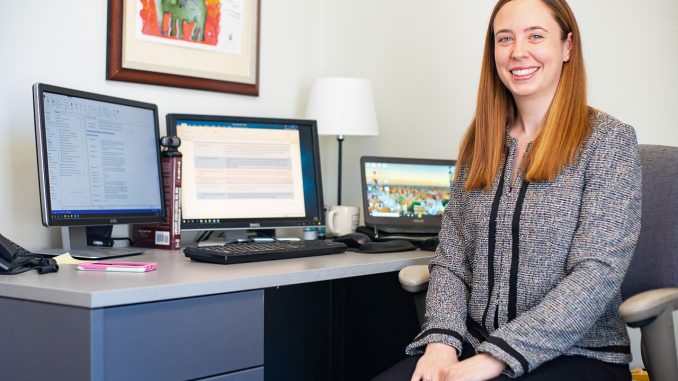
The American Psychiatric Association will cite a Temple researcher’s analysis in its guidelines for treating schizophrenia.
The paper, written by Elizabeth Thomas, a research assistant professor in the College of Public Health, in collaboration with researchers at the Loyola University of Maryland and the University of Maryland School of Medicine, examined the effectiveness of person-oriented recovery over functional recovery for those who have illnesses like depression and bipolar disorder in addition to schizophrenia, Thomas said.
While functional recovery is focused on helping an individual manage their symptoms and develop coping skills, person-oriented recovery focuses on helping people work toward their personal goals in life, she said.
“There definitely has been a whole movement around recovery in recent years,” Thomas said. “There’s a shift away from this more medical model of treatment, where the goal is to cure a person from their symptoms, to really helping them live lives that are meaningful to them, despite having ongoing symptoms.”
Person-oriented recovery can include group therapy sessions and personal goal setting with a therapist, Thomas added.
This practice was developed in the 1980s as providers considered whether individuals in recovery felt hopeful or empowered about their treatment, according to Thomas’ study.
The new guidelines have not been published yet but will include recommendations for health care providers to use person-oriented recovery methods to treat schizophrenia, Thomas said.
Schizophrenia is a chronic mental disorder that can cause someone to feel like they have lost touch with reality, often causing hallucinations, disordered thinking, among other symptoms, according to the Mayo Clinic.
Thomas’s research analyzes 23 studies on person-oriented recovery and found that treatments which combine individual and group therapy models were the most effective, she said.
Thomas often collaborates with Psychosis Education, Assessment, Care and Empowerment at Horizon House, a Philadelphia nonprofit providing mental health services to Medicaid-eligible young people, she said.
Marie Wenzel, the program’s director, said her clients are encouraged to drive their own treatment and stay active in their social lives, a component of person-oriented treatment.
Person-oriented recovery programs offer more unique, personalized treatments, unlike traditional models, she said.
“[We want to] help a young person stay on track to what their life was supposed to be before they developed psychosis,” Wenzel said.
APA’s inclusion of Thomas’ work is an important step toward legitimizing her work, Thomas said.
“It would be the person living a life that’s consistent with what they want, in spite of experiencing the challenge of mental illness,” Thomas said of person-oriented recovery. “They’re out there doing things that are important to them.”


Very good picture Elizabeth!
The article was very good too!
Thank you for sending it to me.